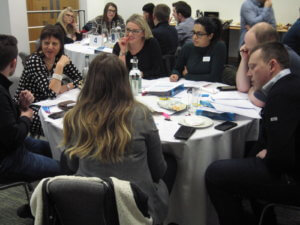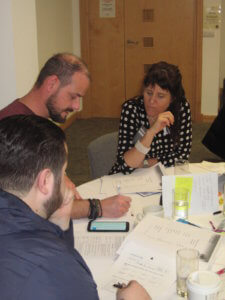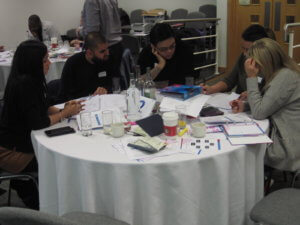“Commercial awareness could be summed up as an interest in business and an understanding of the wider environment in which an organisation operates: its customers, competitors and suppliers.
“It might also encompass understanding of the economics of the business and understanding the business benefits and commercial realities from both the organisation’s and the customer’s perspectives.
“Generally it includes awareness of the need for efficiency, cost-effectiveness, customer care and a knowledge of the market place in which the company operates (current economic climate and major competitors, for example).”
Creating teams with solid commercial awareness is a constant challenge for businesses, especially one operating in the mobile industry where sales performances have to be matched with great customer experience. O2 identified an opportunity to improve both through the use of business simulations.
The challenge:

O2 has made significant investment in creating concept stores in city centres. They are designed to provide a place where customers can experience the digital revolution in its ‘inspire zones’, find out how new technology can fit into their lives, and take advantage of tutorials run by O2 Gurus.
However, as vital as concept stores are for improving customer experience and perception of the brand, O2 knows it also needs to be profitable. This new sales and service role of the store required a shift in strategy and as such a change in the way the concept store teams performed their roles. While assessing how stores could become more profitable O2 identified a gap in the business competencies of its store teams – namely commercial awareness.
Store leaders in O2 stores need to have a broad range of skills and knowledge, much of which can be gained when working as store advisors or assistant store leaders.
However, O2 discovered, that many advisors and assistant store leaders who go on to apply for a leadership role, often lack commercial awareness. This gap in capability often impeded their success.
Christine Elgood, Director of Elgood Effective Learning explains:
”As part of a stores succession programme we worked with O2 to deliver a programme of learning that would develop these much needed skills and help more people succeed as store leaders. ”
The approach
As well as improve commercial awareness, O2 is keen to ensure it retains its staff and gives its people every opportunity to advance their careers. The retail sector is changing at pace, as is the mobile sector. Now more than ever people need to be adaptable and prepared to change with the business.
O2 therefore wanted to create a development programme that would not only hone the commercial skills needed to compete today, but also challenge thinking and expose people to scenarios they wouldn’t otherwise face. This would not only help people be more successful in their current and future roles, bus also help to identify future leaders.
O2 decided a business simulation could help them to achieve their learning outcomes. They are an ideal way to experience a scenario that would not otherwise be experienced in a work context. They develop a curiosity and provide an excellent way to test ideas without there being commercial consequences.
Given Elgood’s pedigree in this area, it has a number of simulations that are ‘ready to go’ and it was agreed that the best one was a scenario based on a manufacturer of garden equipment wishing to diversify into the garden lawn trimmer market.
Christine continues:
“Working in partnership with the O2 L&D Team, we were able to help position the importance of commercial awareness skills, explain how these skills are acquired, and use a business simulation to help bring all of this to life in an engaging and impactful way.
“This simulation drew many parallels with the sales and technology world O2 operates in and was one people would easily grasp – an important requirement as people had very varied levels of business and work experience.”
Working with Andy Scrase, the senior learning consultant on the project, the scenario was fine tuned to meet the nuances of the O2 business. This resulted in a one day workshop, which would help people of any level within stores build commercial awareness and the skills to perform their role regardless of whether they were deemed future leadership potential.
During the simulation, participants were asked to assimilate a detailed business scenario and business case, and design a profitable business model that achieved a return on investment. It posed seven questions in total and challenged decision making, commercial aptitude and the ability to interpret a P/L account, forecasting, planning, and the need to identify relevant measures for success.
The one day workshop formed part of the wider succession programme, and was supported by training booklets with more detailed explanations, blog posts for the intranet and materials that could be shared on Yammer.
Andy Scrase, now learning and content design and development manager, explains the decision to use Elgood Effective Learning:
“We had never used a business simulation to support the development of soft skills so it was really different to anything we had tried before.
The Elgood team was keen to collaborate with us to ensure that the learning really had the desired impact alongside the rest of the programme we were delivering. They took time to understand our business and the challenges we were working to resolve. They also took time to get to know more about the different roles, current and future skills, and were able to produce a simulation that met and exceeded all the learning goals.”
Results
The feedback from the programme was overwhelmingly positive and O2 has since gone on to incorporate the module into another parallel training programme associated to its latest round of store re-fits.
Participants praised the programme for the versatility of the skills they learnt – a critical learning outcome:
“The commercial piece is relevant not only within our roles, but will remain relevant no matter what avenues we choose further down the line. Although we may not be thinking about retail margins or advertising budgets within store, the commercial competitive environment is one we can understand a little better thanks to the training.”
Mark Spiller, O2s learning consultant, sums things up:
“Business simulations as provided by Elgood are a step forward into new ways of learning at O2. We found that not only was the simulation a great learning aid for those that took part, but it also was engaging and thought provoking too. Many of the participants rated the simulation as excellent and some said that it was the best part of a year-long development journey. Working with Christine and team to develop the solution that we delivered together was simple and rewarding.”

